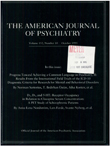Aging, emotional states, and memory
Abstract
OBJECTIVE: This study compared the relation between negative mood states and memory in young and elderly subjects. METHOD: Forty-five normal, healthy young volunteers (ages 19-35 years) and 45 normal, healthy elderly volunteers (ages 60-78 years) were administered a verbal list-learning task and self-rated scales of affective states. RESULTS: The elderly group, but not the young group, consistently exhibited significant correlations between their performance on verbal recall measures and their ratings of their anxiety, depression, and withdrawal; i.e., within the elderly group, higher levels of negative affective states were associated with poorer memory. CONCLUSIONS: These findings indicate that aging modulates the relation between emotional state and memory functions, and they are consistent with the hypothesis that the elderly are more vulnerable than the young to the adverse effects of negative emotional states on memory. Therefore, even in normal elderly individuals without diagnosable psychopathology, negative affective states (such as anxiety and depression) may interfere with memory functioning.
Access content
To read the fulltext, please use one of the options below to sign in or purchase access.- Personal login
- Institutional Login
- Sign in via OpenAthens
- Register for access
-
Please login/register if you wish to pair your device and check access availability.
Not a subscriber?
PsychiatryOnline subscription options offer access to the DSM-5 library, books, journals, CME, and patient resources. This all-in-one virtual library provides psychiatrists and mental health professionals with key resources for diagnosis, treatment, research, and professional development.
Need more help? PsychiatryOnline Customer Service may be reached by emailing [email protected] or by calling 800-368-5777 (in the U.S.) or 703-907-7322 (outside the U.S.).



